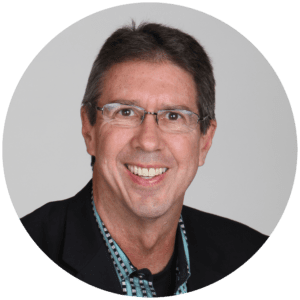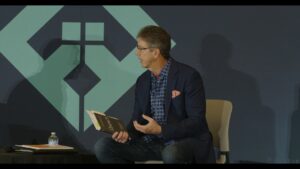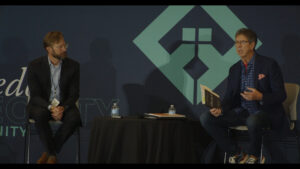
by Dr David Phelps
For the next three weeks, I will be discussing the topic of Legacy. For who you leave behind. For the impact you want to have. For the influence you have today on those around you.
Legacy is lived out every day. Whether you want to or not, you have an influence on those around you. That influence is your legacy.
This series came out of my conversation with David McAlvany from our February Member Event. This first segment (which you can watch above) discusses how you can have an impact at any point in your life. McAlvany shares some provocative insights into how to utilize the compound effect to supercharge your impact.
Dr. David Phelps:
I first became connected to David McAlvany through this book, The Intentional Legacy… I couldn't put it down. It spoke to me. My father was diagnosed that year with esophageal cancer. He lived a great life, and was healthy as can be at 87 years old before his diagnosis. He passed six months later.
I shared this book with my father. My father and I always had a strong relationship, fortunately. We were always strong. But this book was such a great way for us to look at our lives, and our family together. Mother had passed away some years previously, I still have two siblings, and it was a way for us to garner some discussions around areas that we just weren't able to navigate really well ourselves.
In those last six months with my father, we had some of the most reflective and intentional conversations of our lives that are still with me today. And even with the clock ticking, he made sure he could have the most impact while he was still living. It wasn’t too late. This end-of-life impact contrasts that of David McAlvany’s as-early-as-possible approach to impact with his children.
Dr. David Phelps:

You brought your daughter Tess this weekend, who's one of four. She's 12 years old… But I think that may be inspired by your own experience with your father. You make mention in the book that at age six you were giving a talk about the topic of inflation. Imagine that. At age 6, you’re speaking publicly about inflation. Well, how relevant is that today? You mention in the book that that's because you revered your father, such a great role model in so many respects, and you got to ride along his coattails as he was going through the business. Give us a little of that context because people don't know that if they haven't read the book.
David McAlvany:
My dad started on Wall Street in the nineteen-sixties and took an interest in precious metals as a way of solving an inflation problem. A lot of fixed-income clients were dealing with rising inflation rates in the late sixties and early seventies. And so, he did a lot of traveling. He went to South Africa 25 times. I was able to go with him four or five times before I was 12.
We traveled all over the Middle East, Europe, and Africa. And it was an opportunity to learn about how the world works from a geopolitical perspective, from an economic perspective. It was an opportunity to spend time with my dad. And I didn't realize what I was learning. I don't know that I was really absorbing all that much at age six or seven or eight, but there are things that leave an impression. And getting to spend time with a group of adults that are trying to solve problems for their own portfolios or whatever else, that's the world I grew up in.
Legacy should not be an afterthought. What you do today does leave an impression on those around you. And the impact you want to have can start today. Your opportunity to leave a legacy can begin at such a young age. McAlvany’s story is an inspiration.
Later, we discussed some of the commonalities he has seen in helping many high net worth families grapple with the challenges of legacy, and what it looks like to really live your legacy out every day.
David McAlvany:
Part of the reason I wrote the book is that we've dealt with tens of thousands of clients through the years… And after five decades we've seen some families get it done right, and we've seen most who paid attention to only dollars and cents. And regarding culture, we've been on the observant side of a toxic family culture where there's really not a lot of alignment, there's not a lot of care, there's really no skills for communication, or forgiveness and things that frankly we've got to do well as a family…
I wanted to write the book really for my four kids to know what my wife, Mary Catherine, and I's best effort was. “This is what we care about. This is what we tried to put in motion for better or for worse. Now, maybe you can do better.” And that's the encouragement from the beginning of the book to the end. This book is not a model. You don't do A, B, and C and have everything work out. But if there's an opportunity like you had with your dad, a conversation about things that are really important to you, to be able to bridge that and open up the wider conversation with family. That's what I wanted for our own kids, and that's what I hope the book is for others.
It starts with a conversation. It’s about building bridges to the people who matter most to you and using them to pass along your values- education, relationships, financial prudence, etc. – you can begin to have those conversations that highlight those subjects.
David Phelps:
So here's Tess following you along on “business trips” and taking that in. And you're right, we don't think our kids at younger ages are absorbing that much, but I call it “the conversation that our kids hear from the top of the stairs”. [You don’t necessarily need to live in a two-story house] What are they listening to downstairs as Mom and Dad talk about challenges and opportunities? What are they picking up from the conversations you have? The title, The Intentional Legacy, I think says it all.
Are we being intentional or are we just setting up a default legacy, which for most people as you said, is the reading of the will at the end. How are the assets being transferred? You have trusts and all the intricacies of that, but what really is legacy with respect to what we really want to leave to our kids?
You talk about how we are in a generational wealth crisis today. A lot of that has to do with cultural expectations. I call it our cultural dysfunctions which go down to the family… You're very much a traditionalist like I am. The fact that family values are spoken very much against today, how do we bring that back together? Certainly, we can do what we can within our own family, but I know you're an advocate for what you believe, as other people are here. How do we take on a world that's trying to turn things upside down for what many of us grew up believing?

David McAlvany:
I think we can look at any problem that is monumental at scale, for example: $31.5 trillion in national debt. It's a big number. We got there a dollar at a time, and there is no fast way of solving it. We can chip away at it. And I think when we look at the things that you're talking about, the development of family culture, you've got to focus on the little things.
It's the little things that in aggregate, either give you something that's absolutely amazing and beautiful or an absolute terror. How you invest in relationships, that's a lot of what the book is about. If you consider your life like a balance sheet, you've got resources that you're managing. Some of them are real and tangible: land, stock portfolio, etc. Then there are other things that are intangible in nature that you're managing too. And it's the stuff of forgiveness. It's the stuff of loyalty. It's how you laugh together. It's how you play together. It's the things that you love doing that define your culture.
And if we're careful in how we curate that culture, I think what we find is that the next generation has a tremendous amount of buy-in. They enjoy it and they want to perpetuate it. It's one thing to say “we've got a problem with culture” and then sort of hop up on a soap box and just pound the table, “I wish we had what we used to have.” Nostalgia won't save anything, but we can do something.
It's these little investments, whether it's being the hub for the weekend barbecue. We gather. We laugh. We play cards. What are those things that in the minds of your children and grandchildren, you can imagine in the future that has created their nostalgia?
That's what you're doing. You can reverse engineer future nostalgia and feelings of loyalty and togetherness. Put that in motion.
To me, the big solutions, the policy measures – a lot of my dad's friends were in Washington, and a couple of them ran for president. It's been interesting to me to see the big splash and, “If we just do this policy, everything will be fine.” You can look at a lot of poverty issues and say it comes down to fathers not showing up.
I'm not meaning to simplify, but if there was a demonstration of commitment to the home, we wouldn't have the macro issues. So I think we solve the macro at the micro, and we can be very visionary about what we want for our families. And actually very reasonably put in motion something that bears fruit and gives life in our own generation and into the future.
Start today. Get your own house in order. It’s about the culture you create. In your home. In your business. In your life. Will you intentionally create that culture the way you want to? The way that will leave those around you talking about it for years to come?
David McAlvany spoke about investing in relationships. That’s how you live your legacy out every day. In your relationships.
Continued next week…
It’s about the culture you create. In your home. In your business. In your life. Will you intentionally create that culture the way you want to?
To your freedom!
– David
P.S. Whenever you’re ready, here are some other ways I can help fast track you to your Freedom goal (you’re closer than you think) :
1. Schedule a Call with My Team:
If you’d like to replace your active practice income with passive investment income within 2-3 years, and you have at least $1M in available capital (can include residential/practice equity or practice sale), then schedule a call with my team. If it looks like there is a mutual fit, you’ll have the opportunity to attend one of our upcoming member events as a guest. www.freedomfounders.com/schedule
2. Become a Full-Cycle Investor:
There are many self-proclaimed genius investors today who think everything they touch turns to gold. But they’re about to learn the hard way what others have gained through “expensive” experience. I’m offering a free report on how to become a full-cycle investor, who knows how to preserve and grow capital in Up and Down markets. Will you be prepared when the inevitable recession hits? Get your free report here.
3. Get Your Free Retirement Scorecard:
Benchmark your retirement and wealth-building against hundreds of other practice professionals, and get personalized feedback on your biggest opportunities and leverage points. Click here to take the 3 minute assessment and get your scorecard.

